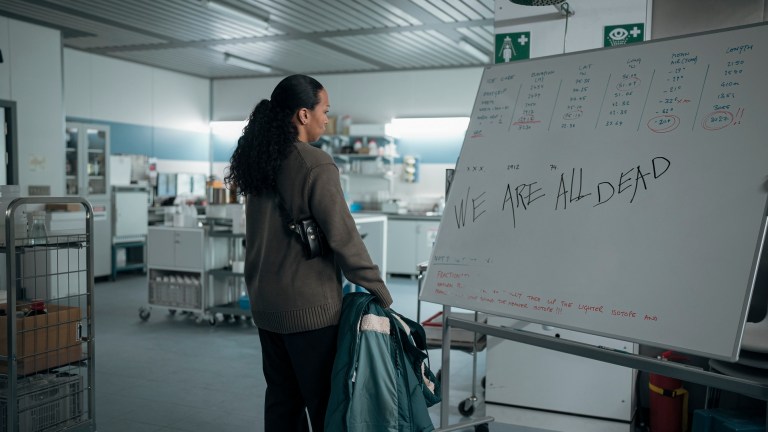Give TV Episodes Titles Again, You Cowards
Selecting the right title for an episode of TV is more important than you think.

As television and film continue to synthesize into a gray streaming sludge known as “content,” TV still has one unique trait going for it. The noble episode.
Television has been an episodic medium ever since it was first invented as an excuse to sell commercial time. Episodes are TV’s secret weapon. Though they exist as a part of a whole, TV episodes are unmistakably their own thing. Each episode of television comes complete with a unique script, a fresh guest cast, and even its own name. Now, however, an insidious new trend has jeopardized TV episodes’ distinctive status. Shows feel increasingly emboldened to leave their episodes title-less.
You’ve undoubtedly seen them as you’ve scrolled through your streaming subscriptions. Whether they run with “Part 1, Part 2, etc.,” “Chapter 1, Chapter 2, etc.,” or even just “Episode 1, Episode 2, etc.,” many series are forgoing their sacred duty to give their episodes titles.
This is frustrating on several fronts. For starters, it discounts decades of TV history. Programs have been giving their episodes names long before televisions even had the technology to display those names for viewers. Only subscribers to TV Guide would know that their favorite episodes of I Love Lucy were actually called “Lucy Does a TV Commercial” or “Job Switching.” Why even name the episodes then? Because they deserved it! Dozens of writers, actors, producers, directors, and designers didn’t work for weeks on something just to throw it out into the world, unchristened.
Additionally, nameless TV episodes lend credence to the fallacy that any great TV show is just an “X-hour movie.” With “Part 1” and “Part 2” in place of actual episode numbers, a series’ viewers can be forgiven for thinking it’s just a long movie arbitrarily cut up into smaller, more digestible parts.
The recent TV landscape has two big offenders when it comes to nameless episodes: HBO’s True Detective: Night Country and Apple TV+’s Masters of the Air. Both go with the boring “Part X” naming conventions and both are particularly disappointing due to the vibrantly-named TV franchises they hail from.
All previous three seasons of True Detective featured episodes with titles and many of them were quite good! True Detective‘s first season opened with the bold “The Long Bright Dark” and concluded with the equally bold “Form and Void.” The finale name comes from the first chapter of Genesis and refers to the Earth being “without form, and void” before God shined light upon it – something that plays directly into Rust Cohle’s optimistic realization that the light is now winning. Night Country is both highly referential to and reverential of True Detective season 1 and it’s a shame that that does not carry over to creative episode names.
Similarly, Masters of the Air is the third entry of a Tom Hanks and Steven Spielberg-produced World War II “franchise” that began with Band of Brothers in 2001 and continued with The Pacific in 2010. The Pacific didn’t have its own episode titles (revealing that this issue isn’t isolated to the streaming era only) but Band of Brothers did and they were profoundly effective.
Band of Brother‘s titles are simple, striking, and urgent – which fits for the immediacy of this saga about Easy Company trying to survive in the European theater. Episode names include “Currahee,” “Carentan,” “Replacements,” “Crossroads,” and “Points. These all succinctly describe the setting and/or most important bullet point of each installment and serve as helpful hallmarks for viewers reflecting back on what they watched. There is no mistaking which episode was the one with Currahee in it because it’s called “Currahee.” Just like there’s no way to misremember which episode introduced all the replacements, was set at the Battle of Carentan, or dealt with the unit trying to accumulate “points” to get to go home.
TV history is filled with great shows that are properly committed to the episode naming bit. Friends‘ strategy of beginning each episode title with “The One With…” meant that each installment featured a joke before it even began. Lost could either go succinct (“The Constant”) or sound like a Fall Out Boy song title (“All the Best Cowboys Have Daddy Issues”). The Florida-set sitcom Cougar Town named all of its episodes after a different Tom Petty song, simply because it was fun to celebrate the legend from Gainesville. And fun is good, regardless of who tries to tell you otherwise.
Against all odds, television has survived as its own distinct medium throughout countless innovations and upheavals. To continue to thrive the folks that make television should consider that every detail is important down to the names of individual episodes.
